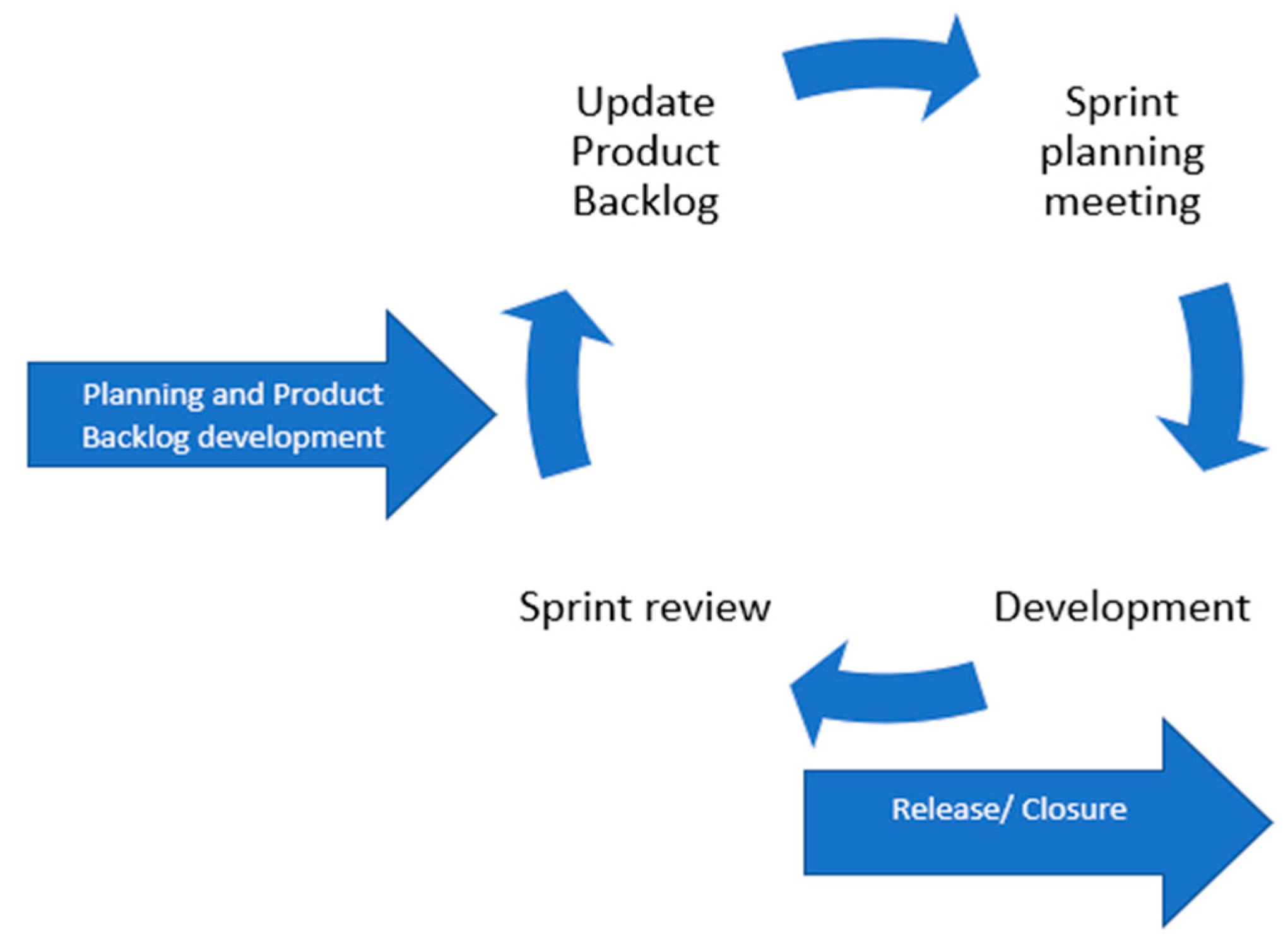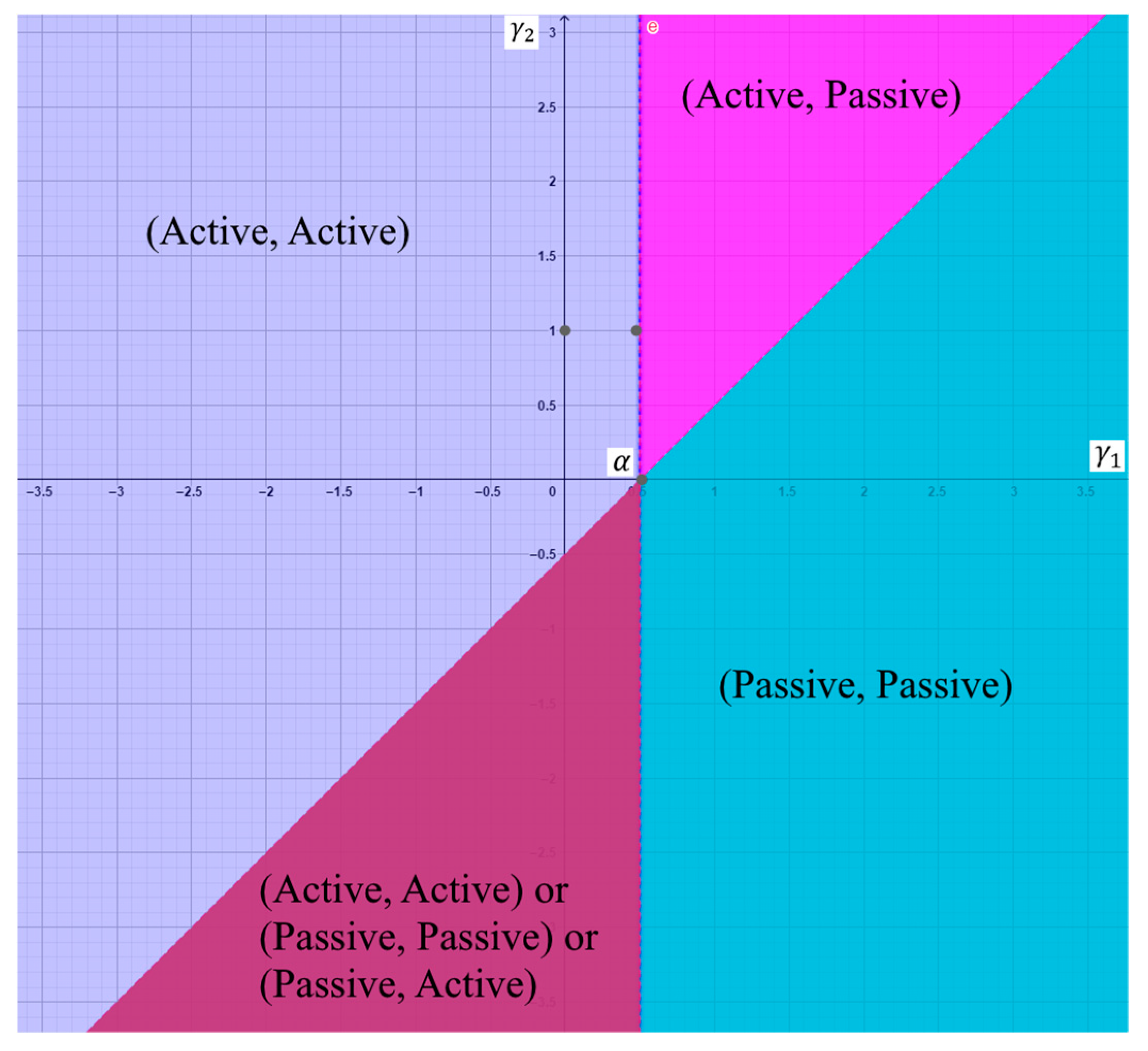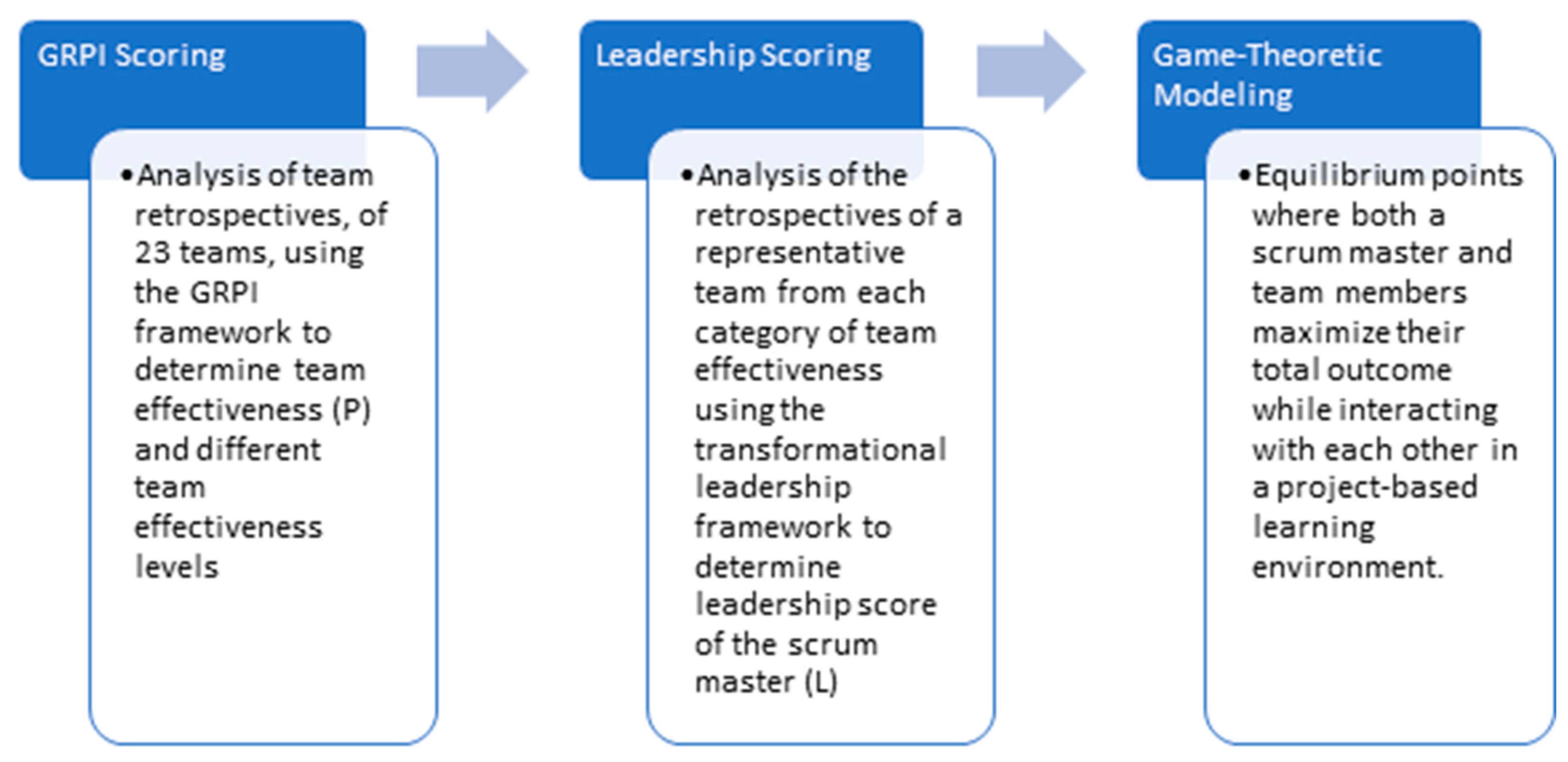2.1. Game Theory and Its Application in Education and Teamwork
Game theory is the research of mathematical models to study the strategies employed when the outcome of an individual’s (player’s) actions depend on the actions of other individuals [
19,
21,
28]. If an interaction among the individuals is strategic and can be described mathematically, then we call this description a game [
28]. Moreover, a game must have four elements. First, is a set of players that are strategic decision-makers. Second is the set of strategies - feasible plans of actions available to the players. The third is a payoff function where a player’s payoff depends on the strategies selected by the players in the game. Finally, there is a solution concept that provides a prediction for which strategy each individual will select [
21,
28]. Game theory is used in many fields to investigate the interactions between the players and find the solutions that aim to maximize the payoff for each player. Therefore, it has extensive applications in many areas, including computer science, biology, economics, social science, systems science, and project management [
29,
30,
31,
32].
In game theory, games are divided into many different sub-categories, including cooperative and non-cooperative games. In this study, our focus is on cooperative game theory. Cooperative game theory focuses on predicting which joint actions players will form and the resulting total payoffs [
33,
34]. For example, a game theory-based approach was used in the analysis of cooperative learning in design studios [
35]. In their study, the authors focused on the interactions in a design studio environment where they obtained both cooperative and competitive behaviors among the team members. One of the most fundamental games, called the Prisoner’s Dilemma [
36], is used to analyze the complex behaviors of cooperation and competition in design studios. The results of the game-theoretic analysis propose that inter-group competition, iterative peer assessment, and information transparency are critical factors in promoting cooperative learning in design studios.
Another study by Pitt in [
37] used game theory in teamwork to investigate group project assessment by game theory. The author assumed to have three groups of students assigned by the instructor, as poor, average, and bright, who are all working on a project as a team. Team members were supposed to work together and receive better payoff by cooperating in various cases to address the assessment in teamwork using a game-theoretic approach. As a result, the application of game theory shows that the best strategy for the students may not be the one that supports cooperation. In addition, it is suggested that putting students into groups can sometimes disadvantage some students compared to others and cause unfair assessment in teamwork.
The authors in [
26] applied evolutionary game theory (EGT) in online study groups to explain students’ participation and engagement in collaborative study groups. They aimed to understand and facilitate group collaboration in online learning settings via EGT. They explored the students’ perceptions of the pros and cons of collaborative groups and found that the Prisoner’s Dilemma could explain the observed lack of participation. Based on the findings, they tried to improve the participation level by mixing the study groups. Burguillo, in [
38], focused on using game theory tournaments as a base to implement competition-based learning (CnBL) with other classical learning techniques to increase students’ motivation and learning performance. The results suggest that a combination of game theory with the use of friendly competitions (competing against instructor defined code and the code of other students in a tournament environment) increased students’ motivation to improve their work and learning performances.
There are limited instances that demonstrate the application of game-theoretic models in educational settings. The literature mentioned above demonstrates a few game theory applications in education, learning, design, and information science to improve team collaboration, but the studies lacked support for their proposed model with actual data. Moreover, the current state of the literature lacks available work in game theory applications for understanding or exploring Scrum Master and team member interactions. Therefore, our work could be a novel contribution to the literature. Our work proposes using real data collected by analyzing the student team retrospectives, and specifically focuses on the interactions between the Scrum Master and other team members within an educational setting when involved in a semi-capstone group project.
2.2. Concept of Scrum, Scrum Master, Leadership and Team Effectiveness
Since the study intends to understand the interaction between the Scrum Master and the development team, it was important to understand the basics of Scrum-agile methodology [
39,
40]. The importance of Scrum can be tied to its adoption in industry. A survey conducted in 2014 with responses from 126 geographically distributed companies showing that over 76% of the organizations had adopted Scrum with varying degrees of success [
41]. Scrum was developed at Easel Corporation in 1993 by Jeffrey Sutherland for use in their software teams with the primary goal of delivering quality software in small time boxes referred to as sprints [
42]. According to [
17], Scrum is “a framework within which people can address complex adaptive problems, while productively and creatively delivering products of the highest possible value”. The Scrum product development approach involves teams working together as a unit in an iterative and incremental fashion [
43]. The agile-Scrum framework allows the developers to share their knowledge, inculcate a sense of cooperation, and allows them to become a self-managed team.
There are only three roles in Scrum: (1) product owner; (2) development team; and (3) Scrum Master [
44]. The product owner determines the release plans and defines the list of requirements referred to as the product backlog. The development team is responsible for implementing the requirements from the product backlog in an iterative, incremental, and self-managed fashion. The Scrum Master is responsible for the entire Scrum process and for teaching Scrum to everyone involved in the project [
44]. The Scrum Master can be referred to as a coach or the facilitator of the project [
18] or in simple words, the Scrum Master is the person who ensures that the team adheres to the Scrum rules, values, and agile principles [
45].
Since the Scrum teams are self-managed, the role of the Scrum Master is that of a coach, since each member shares the responsibility of the project execution and works cooperatively to execute the final project [
46]. The Scrum process suggests a series of stages for planning, implementing and delivering a product [
2]. Following the execution of a sprint, a meeting is held to review progress, raise and resolve issues, and to add to or update items in the product backlog. The review process can be formalized using structured retrospectives which further allows teams to reflect on positive and negative aspects of a sprint while committing to improve on the next sprint [
5]. The release or closure phase prepares the product that has been developed for release and this can include further testing, marketing material preparation, and training material development [
2].
Figure 1 explains the scrum process in detail.
The coaching role of the Scrum Master appears to be perceived as different from their analog, a project management, in other more traditional software development methodologies. For instance, a study by Yang et al. [
47] compared the perception of project managers regarding agile approaches of software development and the role of a project manager. The study revealed that project managers preferred an agile method of software development than the traditional waterfall method. In addition, their study revealed that project managers found a transformational leadership style appropriate for successful software development in an agile environment [
48].
The prior studies [
48,
49,
50,
51] revealed several characteristics of transformational leadership such as self-management, collaboration, collective decision making, shared vision, adaptability, encouraging new ideas, and inspirational motivation. These characteristics make the transformational leadership style appropriate for the agile Scrum approach. Since we plan to see the role of Scrum Master in an educational setting, we used the transformational leadership traits proposed by Astin and Astin [
52] for a transformational student leader. The study in [
52] identified five traits that are important for a student in order to become a transformational Scrum Master: shared purpose, commitment, collaboration, division of labor, and competence. Furthermore, the study also stated that leadership is not a designated trait; rather, it is a shared belief by a group of people who share a common concern and work together towards a purposeful change that results in a positive outcome [
52]. The five transformational leadership traits served as the foundation for developing our leadership rubrics to measure the leadership skills of the Scrum Master.
Similar to industry contexts, in educational contexts the role of the Scrum Master is crucial for the Scrum team as the Scrum Master serves as a coach and facilitator of the team. Since the agile-Scrum framework has been widely used in the industry applied to the agile-Scrum principles on a semi-capstone course project that guided students to develop a prototype as the final course deliverable. Prior studies [
5,
53,
54,
55] confirmed that the agile-Scrum approach had been widely used to teach software development in university classrooms. A study by Magana et al. [
5] led the course that followed an agile-Scrum approach to teach students software development when working as a team. The application of the agile Scrum approach helped students to effectively design and analyze the software solution for their capstone project, and also helped them to reflect on their team dynamics. We further narrowed down our focus on the role of the Scrum Master, the interaction between the Scrum Master and other team members, and the impact of their interaction on team effectiveness [
56].
Furthermore, to understand the impact of the interaction between the Scrum Master and development team, we evaluated team effectiveness from the perspective of the Goals, Roles, Processes, and Interpersonal Relations (GRPI) model. The GRPI model of team effectiveness was proposed by Beckhard in [
57], and measures the team effectiveness as an aggregate of goals, roles, processes, and interpersonal relationships that the team demonstrates. The model is sequential and interdependent, as Rubin et al. [
58] proposed that it is of utmost importance for the teams to define their goals, by explicitly stating the main purpose. After that, the goals are defined; the next task is to allocate roles, as it is important to detail who will do what. Subsequently, the processes are worked out. Processes refer to the planned workflow that each team member will follow to execute the task; this role involves decision making on the part of all team members. Lastly, it is crucial to define the interpersonal relationship that entails how all the team members handle communication, collaboration, trust, and conflict management.
Prior studies have demonstrated this model being used in multiple sectors to measure team effectiveness. For instance, Raue et al. [
59] used this model in combination with the technical, political and cultural (TPC) dimensions of business operations to develop a robust framework of team effectiveness and organizational effectiveness [
60]. The combination helped the teams to function in an organized manner that further resulted in higher performance. In another study by Duckworth [
61], the GRPI model was used to improve team cohesion in a global virtual team setting. The study found that GRPI was an effective approach to enhance team effectiveness, and further demonstrated how project managers, in dispersed settings, who were trained on the principles of the GRPI model drastically improved the overall performance of the company as a whole. Carlock [
62], utilized the team effectiveness model to develop assessments for their employees to measure team cohesion. Carlock’s study emphasized the role of the leader and the team members in setting the goals, roles, interpersonal relations, and group processes. The study developed two assessments to measure the role of leader and team members on the GRPI framework.
In this study, we used the GRPI framework as the basis to evaluate team effectiveness. Since the prior studies by [
60,
61,
62] already demonstrated the impact of this framework in evaluating team effectiveness, we also intend to explore the GRPI framework to understand the team effectiveness in an Scrum agile environment. We also developed a rubric for assessing team effectiveness (see
Section 3.3.). Furthermore, the scores were analyzed statistically, and the teams with the highest score, median score, and lowest score were selected for the purpose of experimenting using game-theoretic modeling.










